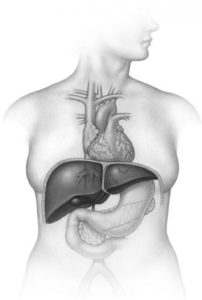Autoimmune Hepatitis (AIH)
What is Autoimmune Hepatitis?
Autoimmune hepatitis (AIH) is inflammation of the liver that is caused when your body’s immune system attacks your liver Normally, your immune system attacks bacteria or viruses. When your immune system attacks a part of your body, it is called an autoimmune disease. What causes autoimmune hepatitis is not known. It is not contagious, and it is not caused by anything you do.
Sometimes people who get AIH also have another autoimmune disease such as vitiligo or celiac sprue. Or you could have family members with autoimmune disease.
Autoimmune hepatitis is a chronic – something that lasts for a long time – disease. But it can be managed. Anyone can get AIH, including small children.

What is an Overlap syndrome?
When people have AIH and primary sclerosing cholangitis (PSC) or primary biliary cirrhosis (PBC), it is called overlap syndrome. PSC and PBC are diseases of the bile ducts. The bile ducts carry bile to the intestine.
Overlap syndrome of AIH and PSC is more common in children than adults. Overlap syndrome of AIH and PBC only occurs in adults. If you or your child has overlap syndrome talk to your health care provider about what to expect.
If you or your child has autoimmune hepatitis, read this information. Learn how you can manage the disease. Ask your health care provider any questions you have.
What Are Symptoms of AIH?
Early symptoms of autoimmune hepatitis can point to many different problems. This can make it hard to diagnose.
Early symptoms can include:
- Fatigue (being tired)
- Nausea
- Joint pain
Symptoms can start suddenly, or you can notice them over time. If you have symptoms that don’t go away, see your health care provider.
Jaundice, a yellowish tint to the skin or eyes, is a symptom that appears later. Jaundice may mean the liver disease is more severe.
How Is AIH Diagnosed?
If you have symptoms that don’t point to any one problem, your health care provider may order blood tests as part of your physical exam. If your blood tests show problems in your liver, your health care provider may order more specific blood tests to rule out other liver problems.
Many people will need to have a liver biopsy to confirm the diagnosis of AIH.
What Is the Treatment for AIH?
The goal of treatment for autoimmune hepatitis is to decrease the liver inflammation. For most people, treatment will continue indefinitely. Treatment most likely will include prednisone and azathioprine. Other medications may also be used.
Most people respond well to treatment. Take your medication(s) as prescribed for the best outcome.
Prednisone
Prednisone is a corticosteroid, an anti-inflammatory medication. Usually, you start treatment with a high dose and take less over time, until you are taking the lowest possible dose.
Possible side effects from taking corticosteroids over a long period of time may include weight gain, development of a round face, increased blood sugar levels (diabetes), and thinning of bones.
Azathioprine
Azathioprine is an immunosuppressant medication. Usually, it is used along with prednisone to treat AIH.
Side effects of azathioprine may include a fever when you first start to take it and nausea. Rarely you may have low blood counts, making it hard to fight infection, or pancreatitis.
Follow-up appointments
You will have regular blood tests to watch for side effects while you take prednisone and azathioprine. Blood tests will also look at your liver.
How can one Live with AIH?
After you are diagnosed with AIH, you can lead your life as you normally do, with a few exceptions. You do not need to change your eating habits as long as you eat a healthy, wellbalanced diet. However, do not drink alcohol. Drinking alcohol increases the risk of liver damage.
Avoid medications that may damage your liver. In general, you can take acetaminophen or ibuprofen in the recommended doses for pain. If you have questions about any medications, talk with your health care provider.
Stay up-to-date with your vaccinations. Get a flu shot every year. Talk to your health care provider before you get live virus vaccinations such as the shingles vaccine.
You can do your usual activities. In fact, it is a good idea to have some kind of regular exercise program. Before you start an exercise program, talk with your health care provider.
Whatever exercise you do, pace yourself and rest when you feel tired.
How often you see your health care provider depends on how well controlled your AIH is and how you are doing with the medications.
Ask your health care provider about specific activities or concerns.
